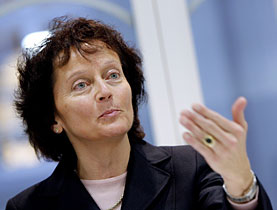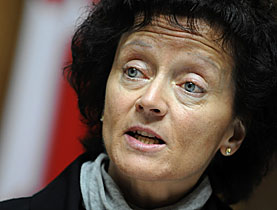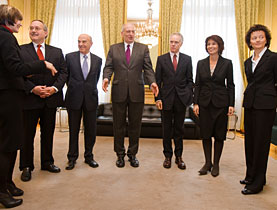Supporters rally as minister says she will stay

Around 12,000 people have rallied in the capital Bern in support of Justice Minister Eveline Widmer-Schlumpf, who is facing expulsion from the Swiss People's Party.
The protest outside parliament coincided with a party ultimatum for the minister to either give up her cabinet post or her party card by Friday. Widmer-Schlumpf said she would not give in.
Widmer-Schlumpf, in defiance of party bosses and backed by the government, used the occasion instead to set out her goals for the next four years in office.
The 30-year People’s Party member said she wasn’t about to abandon her political views, which include individual responsibility, respect for democratic rules and federalism.
She added that she was particularly impressed by the outpouring of support she has drawn since the party leadership told its branch in Widmer-Schlumpf’s home canton of Graubünden to expel her if she failed to comply.
The cantonal central committee rejected the demand despite threats against its own existence, describing it as “unacceptable”.
The government called the move “crass” and pointed out that its newest member had been democratically elected.
All the main political groups – the centre-left Social Democrats, the centre-right Radicals and Christian Democrats as well as the Greens – strongly condemned the People’s Party, all saying the attempt to remove Widmer-Schlumpf was “unworthy” of a democracy.
Against party wishes
The justice minister replaced the party’s controversial representative, Christoph Blocher, in the government last December. She was elected to the cabinet by parliament against the wishes of the People’s Party.
The party justified its intention to expel her by saying that she had pushed Blocher from office, and “placed her personal interest and that of the Social Democrats above the interests of her own party”.
The party’s central committee approved the ultimatum for Widmer-Schlumpf to step down by 67 votes to five at a meeting last week.
Widmer-Schlumpf, whose father was also a People’s Party minister, denied the election result was rigged. She spoke out last week, saying that she would not let herself be intimidated.
Blocher responded to the situation on Friday by calling for a change in the way cabinet members are nominated.
He told the Neue Zürcher Zeitung newspaper that candidates should no longer be nominated by the parties, suggesting that they should instead undergo a public hearing, after which Parliament would then accept or reject their nomination.
The Swiss government consists of seven members, representing the four largest parties in parliament. The People’s Party has two seats, but when Blocher was ousted it withdrew recognition of Widmer-Schlumpf and its other representative, Defence Minister Samuel Schmid, and announced it would go into opposition.
No cabinet minister has ever been expelled from a Swiss political party, but several members of cantonal and communal governments have been removed.
Tackling crime
Friday’s protest was organised by the women’s umbrella organisation Alliance F, which said it “strongly condemned” the rightwing People’s Party move.
Widmer-Schlumpf told the demonstrators: “You have helped me during these difficult days. You came here for me, but not only for me, because doubt has been cast on our democratic institutions.”
Friday also marked her 100th day on the job, a period that she said had been “intense.” Her goals for 2008-2011 will be prioritising security and the fight against crime, and her ministry is proposing a series of specific measures.
She plans to tackle crime among immigrants, demanding cantons expel foreign offenders based on a strict interpretation of Swiss laws and she wants naturalisation procedures to be followed more closely.
Youth violence will also be high on the list of priorities for the next four years, with Widmer-Schlumpf demanding a better understanding of the problem, including its real extent.
She said though that she was not asking for tougher laws for foreigners or against youth violence, stating that current legislation was sufficient. But she added that its application needed to be stricter.
International cooperation in security will be promoted as part of her attempts to combat organised crime and attention will be paid to the development of the Schengen agreement.
swissinfo with agencies
Christoph Blocher was only the fourth cabinet minister in Swiss history to fail to win re-election.
Usually it’s up to a cabinet minister to choose the moment to step down. Ministers are elected for a four-year term by parliament.
Eveline Widmer-Schlumpf became the third woman in the cabinet, joining Foreign Minister Micheline Calmy-Rey and Economics Minister Doris Leuthard.
The four main political parties have been represented in the seven-member Swiss government for nearly 50 years.
The party-political make up remained unchanged between 1959 and 2003, when Christoph Blocher won a second seat for his party at the expense of the centre-right Christian Democrats.
The four main parties have an 80% majority in parliament, while the Greens are the largest opposition party with around 10%.
Over the past 15 years the People’s Party has gradually increased its share of the vote to 29% in October’s parliamentary elections.

In compliance with the JTI standards
More: SWI swissinfo.ch certified by the Journalism Trust Initiative











You can find an overview of ongoing debates with our journalists here . Please join us!
If you want to start a conversation about a topic raised in this article or want to report factual errors, email us at english@swissinfo.ch.